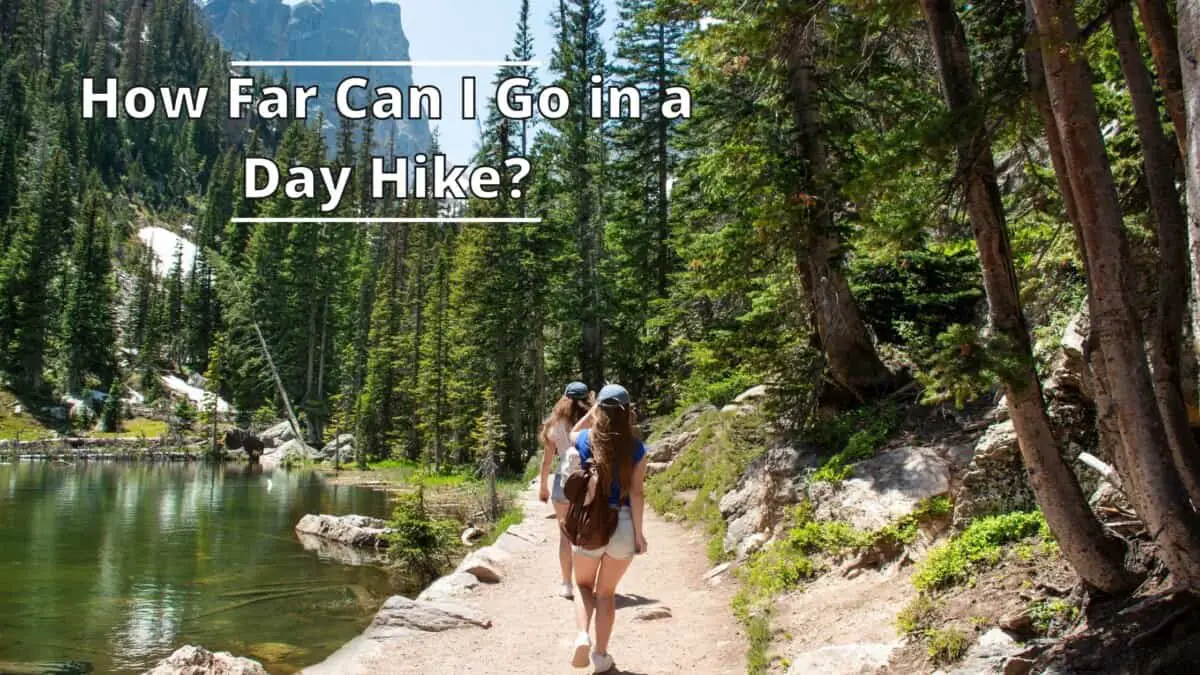Hiking is a very exhausting activity. A person needs to be physically fit before hiking as it will use up a lot of energy. There are preferred distances for beginner hikers and expert hikers. Before engaging in this activity, you should know some things you need to take into consideration.
If you wonder about the distance you can possibly hike for a day, then you found the right place to know this.
A person can hike for 16 to 24 miles in one day but for beginners, we suggest you go for a 5 to 8 miles hike. Experienced hikers can reach more than 30 miles depending on their body fitness and several other factors you should take note of.
The type of terrain, weather condition, and backpack weight are the central elements that influence a hiker’s capacity and endurance. Hiking solo or in a group will also make a difference in how far you can go in one day.
Beginners can possibly hike farther distances. But, to avoid unexpected things to happen like not reaching the destination, it is better to know your limits before go go on a hiking trip. In this article, we will be discussing the limits and preparation of novice and average hikers.
Choosing the right footwear for your hike is very important. Wearing the wrong footwear could lead to sore feet and blisters which will prevent you from enjoying your hike to the fullest. Lucky for you, we have a list of the best hiking shoes for men, women, and children all in one article.
How Far Can a Beginner Hike in a Day?
An average person may be able to hike for about 16 or 24 miles in a day. Not 24 hours but about 10 or more hours and that includes your resting time. If you ask if you can go for 20 miles for a beginner, you can but that requires proper fitness and preparation.
Other factors that affect your hiking capacity are the kinds of terrain, elevation, weather condition, and your backpack weight.
There are several bases on how you can estimate the person’s capacity to the mileage they can hike. If you are fit before you engage in this activity, then you can endure far distance but for beginners, it is recommended to take things gradually.
Experienced hikers expressed that it also depends on the type of ground surface they are traveling to.
If you perceive that you can hike about 3 miles in an hour. We can say that you can. But, you should think of these factors first as the rapidness and effort exertion will be affected by the following:
- body fit or condition
- land structure or surface
- elevation
- weather
- backpack load
There are hikers who are accustomed to this activity can go further than 24 miles. Some can reach about 30 miles or more. When we consulted with other hikers, they told us to completely shape up before you proceed to reach this because it can harm your body at the end of the day.
In terms of backpacking, a person has a walking speed of 2 to 3 and a half miles per hour, which is possible to reach 28 miles for one day. Still, this is highly affected by the elements we mentioned, especially the weight of the backpack and the terrain to walk. If it requires you to climb up or walk into elevated terrains, then that’s a different story.
Hiking is good with hiking buddies, but it doesn’t mean you can’t go alone. Solo backpacking provides mental relief, and allows a person to chill out for a while and have some alone time. But before you embark on your solo adventure, here is everything you need to know about hiking alone.
How Many Miles Should a Beginner Hike?
Experienced hikers recommend a beginner to hike from 5 to 8 miles per day. We estimated that if your body begins to feel exhausted after 5 miles of walking, then you should probable consider to hike from 2 to 3 miles.
To clarify, if you go for a 5 miles hike, divide the 5 miles by 2. 2.5 miles is one way, and the other 2.5 miles is for returning.
Are you physically fit for a long day hike?
The 8 miles we propose requires a newbie hiker to work out properly or it is recommended for a person who is physically fit. Meaning, this is applicable to those who exercise daily or practice proper fitness. Always remember that endurance is an essential key in this activity.
The best start for a beginner is 5 miles or less. The specific distance we have stated is the usual point for a novice to hike. To improve your endurance, gradually add some distance to your next hiking adventure and also, develop your physical condition.
How to test your physical capacity?
We tried this tip to appropriate the mileage of hiking to your limit. Try to walk somewhere then measure the distance you are able to set foot. If your body starts to get tired, stop walking then check how much you have traveled. Divide into half the total mileage you are able to achieve in this activity and that is the recommended distance you should hike.
You can use a pedometer or just look for the distance marker in the road if you want to try measuring your limits. You can also research the stretch length of the specific place you want to walk through. Just a warning to not push yourself too hard from the start because it will result in sickness and injury.
Hiking is healthy for both our body and our mental well-being. That’s why many people are enjoying the advantages of hiking. We have gone on countless hikes and we have a few tips to help you enjoy hiking even more.
Do’s and Dont’s in Day Hike
If you are hiking, always remember the Leave No Trace principle. Use the equipment suitable for beginners, have a background of the place, check the weather, and choose an appropriate place to hike for beginners.
These are just the most essential reminders to remember if you are planning to hike.
Let’s discuss the proper ways and the things to avoid when hiking:
-
Leave No Trace
Don’t leave your garbage somewhere or destroy something in the surroundings. This is an environmental conservation practice.
-
Choose everything that is fit for beginners
From the place, physical capacity, and gears, always select the beginner type.
-
Know the place and weather
This will help you to visualize the place and be ready for the possible rains. We recommend you bring GPS and compass.
-
Take your time to hike
We advise you to start early, warm-up then avoid hurrying. Be attentive and discipline yourself to follow the scheduled time.
-
Tell someone before you hike
If something happens unexpectedly, they can immediately aid you.
-
Be vigilant
Forest and mountains don’t have fine terrains so to avoid accidents, be watchful of the surface you are walking to. There are also places that shelter wild animals. If possible, be silent.
-
Don’t forget your checklist
This is another salient element to prepare before packing and going to hike. It will prevent you from overlooking and misplacing important stuff and equipment.
-
Read some of the tips and etiquettes
It is great to learn from experienced hikers. Check some online reviews and you can also formulate your own reminders with such.
-
Inform everyone that you are back
Since you told someone that you are out there hiking from the days you stated, it is best to notify them that you are back. That will prevent them from worrying and avoid emergency actions they might execute.
Conclusion
Hiking for beginners may look very challenging but as the time you practice this constantly increases, you will be used to everything. The important factors are just the best warning for novice hikers to remember. It is to avoid accidents, injuries, and bad encounters.
Preparing your body and equipment ahead of time is advisable also. Aside from the idea that you can endure the hike, you are also packed with gears that you will be needing. Practice and learn from experience. No one starts expertly so take things slowly.

